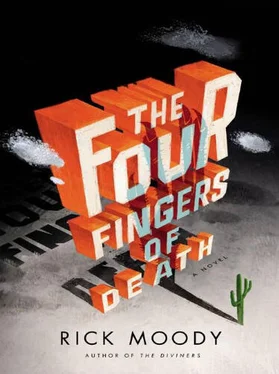According to Brandon, there was nothing to worry about. According to Brandon, the integrity of NASA’s long-term goals — terraforming, resource exploitation, a permanent human colony on Mars — had long since been jeopardized by José. Brandon had no choice but to do what had to be done. Likewise the Debbie Quartz incident. Debbie was nice enough, sure, but she was unprepared for what was required, for the Darwinism of the Mars mission, and he’d proved it by just talking sternly to her. She had to go .
Steve Watanabe, when he heard these enfeebled rationalizations, which have been much fleshed out in my account, felt that Brandon was not himself. There was no gratitude for his having made a drive of many days on a forklift. And Steve was not reassured by the dull, lifeless tone with which Brandon directed him to the grinding and milling tools. They were to drill in the eastern outflow channel of the Valles Marineris, technically known by another one of those creepy Greek names, the Ius Chasma. The Ius Chasma, you’ll recall, is about three and a half miles beneath the plains into which it is carved, running parallel to it the Tithonium Chasma, which gets so narrow it’s just like a big crack in the ground, except that the crack goes down miles. Between the two is a ridge that runs along the center. Ius is about four hundred miles long, but it’s only a tiny portion of the enormous Valles Marineris complex, which I have already said is about as far across as the United States. In most of it, you wouldn’t even know you were in a canal. Not so here at Ius. You see a canyon wall that’s miles high, you don’t forget it.
Steve and Brandon had got down twenty-five feet or so, into the bottom of one of the chasm walls, and they were digging mostly into basalt. These were the kinds of environments, however, according to the Martian surveillance satellites, where you found salt beds and, in some cases, dampness . The evolving theory — that there were periodic underground aquifers that had in the past caused catastrophic flooding on Mars — provided for, indeed required , spots of dampness. That water had to carve out those canyons somehow, and it wasn’t all evaporated. It couldn’t be. A team of geologists back in Florida watching all of this on a video screen cheered for every new foot of exposed crust. Much of this work, excepting the occasional buzz and roar of drilling automata, was done in silence and darkness. Steve, according to the notes he was posting, tried to engage Brandon periodically, but Brandon would no longer participate in the subtler human interactions. Brandon, former boxer and smartass, had, in the weeks alone, become a grim, silent wraith. When there was a lapse in the pace of operations, he would berate Steve until Steve was willing to get back to work, and the only thing that Steve could seem to do to get time off was to faint from exertion, which he did periodically. The deprivation of sunlight in the chasm was somehow even more obliterating than he imagined it might be on Earth, since it was the last thing he felt he had in common with those he missed back home: sunlight.
They had a rope-and-pulley system that led down into the godforsaken hole in the ground, and a heat lamp that they used to keep warm, and they ran it off the battery of the rover, via reinforced extension cord, and there was a small generator, and it was in this half-light that Steve saw Brandon’s grimy face, as Brandon pulled off his visor and attempted to taste the salt they were blasting away from the walls of the excavation site in a storage drum. Brandon tasted it. There was some kind of liquid there, undeniably, and the action of the drills, the friction of it, was liquefying some of what was frozen.
“You aren’t drinking that, are you?”
“Keep drilling. It’s sterile.”
“Seriously, are you sure you should be drinking that?”
“Drinking what?”
“Weren’t you just drinking some of that stuff coming off the walls?”
Brandon, in his relentless monotone: “There’s water here. I’m verifying. We’ll be reporting back to Earth.”
“You’re not going to be doing very much verifying if you catch some germ.”
“Conductors. Radioactive material. That’s our brief. No germs.”
There was, however, the possibility of geological collapse. That was another peril. The Valles Marineris had all kinds of collapses. There were entire canyons in the complex of Valles Marineris that were sealed off because the walls had collapsed, and when you were digging at the base of miles of canyon wall, trying to get down a hundred meters, to the beginning of the aquifer, in search of Martian life , or in search of some new kind of raw material for semiconductors, it was not unreasonable to assume that there might have been or could be again a collapse. Hebes Chasma had a collapse. It was sealed off. And the way the wind blew in there, there were all kinds of erosion taking place all the time. And Steve worried ceaselessly about when the others were going to come for them. In what way would they come? Would they come in the ultralight? In a ragtag army? Flown in and air-dropped in a secure perimeter? And when they came, in what way would they mete out Martian justice, that resource which only begins to obtain when a certain critical mass of human beings, a community , is present? In what form would justice be dispatched, and who would be the duly appointed jurist?
At sunset, when the batteries were run down on the drills, the two trudged out of the cave to load the last of the minerals into the drums on the back of the rover. Deimos, the second moon, hung in the salmony sky.
In the rover, besides the drums of ore, there were piles of slag, a silvery, reflective muck that definitely had some liquid in it. Whether it was water, or chemical runoff, or what, was unclear. The whole mining operation, like most of Mars, smelled awful, smelled like a sulfur refinery. Steve and Brandon were meant to carry a half ton of the rock back to base camp, where it would ultimately be loaded into the Earth Return Vehicle for the trip home. Assuming they could somehow commandeer the ERV. Steve, according to his diaries, was weary in ways he had not been since landing on the Red Planet, and he wished he could be sure that he was doing the right thing, that cooperation with the authorized mission would be the way to secure things for his family back on Earth. But he wasn’t sure, and this lack of certainty was made worse when he got a good look at Brandon that day, in the remaining sunlight. Brandon, who despite his capacity for vainglory and ethnic one-liners was sort of hale and squeaky clean, now looked like a different person. His skin had become leathery and gray, and his eyes were sunken into his head. And they were black around the rims.
“Brandon, are you feeling all right?”
Brandon didn’t say anything, and his heartless and empty glare in reply to the question didn’t inspire confidence. Steve didn’t bother to pursue it. That was when, in looking up for another glimpse of Deimos, the hummingbird of the solar system’s moons, Steve saw it; he saw how justice was going to be pursued and who, exactly, was going to be doing the pursuing. Jim Rose. The captain. Up above Steve now, and coming straight for them in the ultralight, swooping down out of the sky as though it would be easy to land an ultralight in the middle of a canyon, which perhaps it would be, was none other than Captain Jim Rose. The identity of the pilot was easy enough to surmise.
There was a volume of sand on the floor of the canyon, and a thick carpeting of dust. Not like the rocky plains out where the three spacecraft had done their awkward touchdowns. This was where the ultralight came down, like a flaming eagle out of some interminable Wagnerian opus. The ultralight was easier to fly on Mars, if you believed the hype about a meager supply of gravity and no magnetic poles to speak of. It was borne aloft on the rather manic winds. The ultralight came down out of the sky and seemed to merge with its own shadow in the deep red of sunset, and with it now came the blast, at the site of the rover. There was impact. Blast and heat, enough to knock over the one drum full of silicon oxide and related geological treasures, which in turn toppled over the other that was waiting to be picked up with the hydraulic lift, and two or three days of mined riches spilled out into the sand. The barest portion of the recent treasures collected. The projectile, the missile that caused this damage, was some incendiary device, a container of corn-based ethanol perhaps, from the ultralight, which, like the rover, operated with solar cells but which required a little gas to get aloft.
Читать дальше












